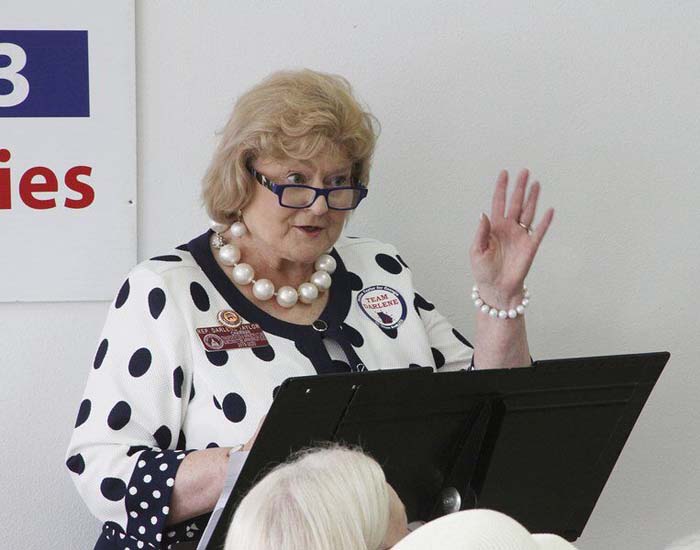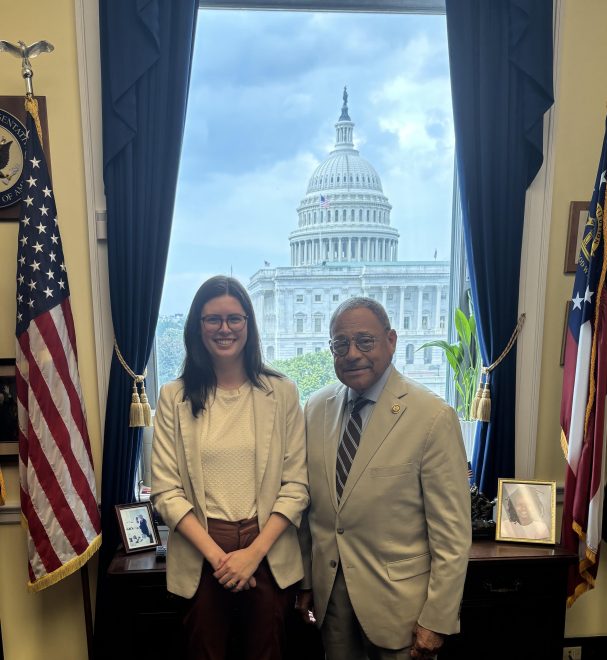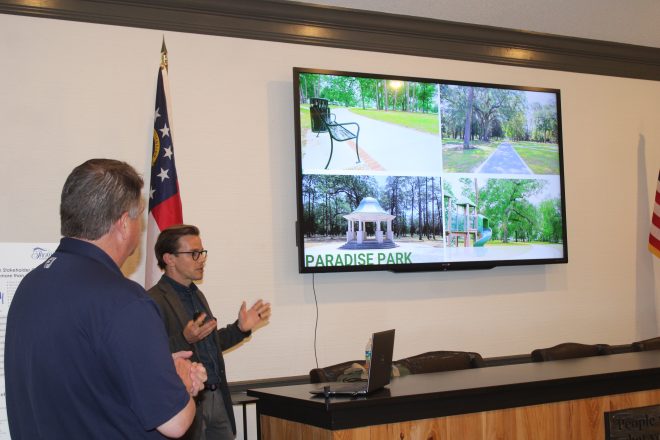Taylor: Fight for women’s rights continues
Published 10:19 am Friday, September 18, 2020

- Pat Donahue/Times-EnterpriseState Rep. Darlene Taylor discussed the struggles of the women's suffrage movement during her Constitution Day address Thursday.
THOMASVILLE — The fight for women to gain the right to vote across the country was not easy, state Rep. Darlene Taylor said Thursday.
Taylor (R-Thomasville), the fifth-term lawmaker from House District 173, also urged those at her Constitution Day address to fill out the census and to vote.
Trending
“Voting is not just our right. It is obligation and our responsibility,” she said to a roomful of supporters at Thomas County GOP headquarters. “As citizens, we owe it to our heritage and our future to be informed and to speak with our vote.”
Taylor recounted the travails suffragists faced in securing women the right to vote. As far back as the 1790s, some New England towns allowed women to vote and serve on local boards.
But voting for president was reserved for male property owners, almost all white, and a few free Black men in the North. In 1846, a group, most of whom were dedicated to the abolition of slavery, met in Seneca Falls, New York for a women’s rights convention, headed by Elizabeth Cady Stanton and Lucretia Mott.
“Most of the delegates agreed, women deserved to have their own political identity,” Taylor said.
An amendment offered in 1789 to allow women the right to vote was not ratified.
Wisconsin, admitted to the Union in 1848, had the most liberal voting laws in the nation at the time. But did not allow women to vote, Taylor said. Western states, by 1910, were allowing women to vote.
Trending
But it wasn’t until the 19th Amendment was ratified on August 16, 1920, that women secured the right to vote in federal elections.
“And on November 2 that year, more than 8 million women voted for the first time,” Taylor said.
Women fighting for the right to vote staged hunger strikes and even picketed the White House. Many, however, were arrested, beaten or sent to mental hospitals, Taylor said.
“We’ll never understand what they went through,” Taylor added. “They did it for us so we could have the vote.”
The National Women’s Party, in 1922, proposed a Constitutional amendment to prohibit discrimination based on sex, Taylor pointed out.
“We’re still waiting for that,” she said. “It’s still going to take us a long time. We were fighting, y’all.”
Thursday marked the 233rd anniversary of the Constitution’s enactment, a document that took four months to craft.
“It is the celebration of a living document that shapes the destiny of every U.S. citizen,” Taylor said of Constitution Day. “Every American ought to be aware of the provisions stated in our Constitution, addressing individual rights and freedoms.”
The Constitution has only 4,400 words. One word that does not appear in the Constitution, Taylor noted, is democracy.
“It is the shortest constitution of any major government in the world,” she said.
Convention delegates worked in secret, even placing a guard outside the Pennsylvania State House in Philadelphia where they met. The Constitution was written to replace the Articles of Confederation, the original governing document for the United States.
“We thought we had it all figured out how to run a country,” Taylor said.
One of the sticking points for the states, Taylor said, was that there be a Bill of Rights, the first 10 amendments, and the first of these guaranteed the right to religion, free speech, peaceable assemblies and the freedom of the press.
Abraham Baldwin and William Few represented Georgia at the convention, and Few stood alone among the delegates as the only one to represent farmers, Taylor added.
The Constitution also established the electoral college and provided that its members would be based on the number of senators and members of the House of Representative for each state. It also decreed that those House members would be based on state population, with each state then getting one senator.
Recent efforts and calls to abolish the electoral college are “a horrible idea,” Taylor said.
“That is what protects us,” she said.
Another group, Taylor said, “didn’t want Congress to have a hand in picking the president because it opened the door to corruption.
“Our founding fathers were pretty smart, weren’t they?” Taylor asked.
The electoral college also prevents states with overwhelming populations from determining the president. On a handful of occasions, the winner of the popular vote, including twice this century, did not win the presidential election.
U.S. House seats will be redrawn with the results from the current census, and individuals have to the end of the month to fill out the census.
“It is absolutely important that we do,” Taylor said. “Be counted.”
Taylor implored people to vote. She quoted Franklin D. Roosevelt, who said, “Nobody will ever deprive the American people of the right to vote, except the American people themselves and the only way they can do that is by not voting.”
“The largest party is neither Democratic nor Republican,” Taylor said. “It’s the party of non-voters.
“We should never forget we are the government, we ourselves, and not an alien power. Voting is our power. When we vote, we use our power to choose, to speak up and to stand with those who support us and our beliefs.”





